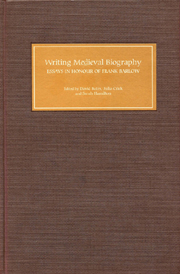Book contents
- Frontmatter
- Contents
- Preface
- List of Abbreviations
- Introduction
- 1 Did Charlemagne have a Private Life?
- 2 Bones for Historians: Putting the Body back into Biography
- 3 ‘Carriers of the Truth’: Writing the Biographies of Anglo-Saxon Female Saints
- 4 Alfred and his Biographers: Images and Imagination
- 5 Re-Reading King Æthelred the Unready
- 6 Writing the Biography of Eleventh-Century Queens
- 7 The Flemish Contribution to Biographical Writing in England in the Eleventh Century
- 8 The Conqueror's Earliest Historians and the Writing of his Biography
- 9 Secular Propaganda and Aristocratic Values: The Autobiographies of Count Fulk le Réchin of Anjou and Count William of Poitou, Duke of Aquitaine
- 10 Reading the Signs: Bernard of Clairvaux and his Miracles
- 11 Arnulf's Mentor: Geoffrey of Léves, Bishop of Chartres
- 12 The Empress Matilda as a Subject for Biography
- 13 The Gesta Stephani
- 14 Writing the Biography of Roger of Howden, King's Clerk and Chronicler
- 15 Writing a Biography in the Thirteenth Century: The Construction and Composition of the ‘History of William Marshal’
- 16 The Strange Case of the Missing Biographies: The Lives of the Plantagenet Kings of England 1154–1272
- Index
14 - Writing the Biography of Roger of Howden, King's Clerk and Chronicler
Published online by Cambridge University Press: 12 September 2012
- Frontmatter
- Contents
- Preface
- List of Abbreviations
- Introduction
- 1 Did Charlemagne have a Private Life?
- 2 Bones for Historians: Putting the Body back into Biography
- 3 ‘Carriers of the Truth’: Writing the Biographies of Anglo-Saxon Female Saints
- 4 Alfred and his Biographers: Images and Imagination
- 5 Re-Reading King Æthelred the Unready
- 6 Writing the Biography of Eleventh-Century Queens
- 7 The Flemish Contribution to Biographical Writing in England in the Eleventh Century
- 8 The Conqueror's Earliest Historians and the Writing of his Biography
- 9 Secular Propaganda and Aristocratic Values: The Autobiographies of Count Fulk le Réchin of Anjou and Count William of Poitou, Duke of Aquitaine
- 10 Reading the Signs: Bernard of Clairvaux and his Miracles
- 11 Arnulf's Mentor: Geoffrey of Léves, Bishop of Chartres
- 12 The Empress Matilda as a Subject for Biography
- 13 The Gesta Stephani
- 14 Writing the Biography of Roger of Howden, King's Clerk and Chronicler
- 15 Writing a Biography in the Thirteenth Century: The Construction and Composition of the ‘History of William Marshal’
- 16 The Strange Case of the Missing Biographies: The Lives of the Plantagenet Kings of England 1154–1272
- Index
Summary
THE DIFFICULTIES faced when writing biographically do not need rehearsing and are an important theme of this book, especially when the subject is neither a king, queen nor major ecclesiastic. In the case of an author who wrote over a longish period we should, however, at least be able to trace some aspects of the development of an individual mind over time. The fact that Roger of Howden chronicled contemporary events from 1170 to 1201, and in enough detail to fill five Rolls Series volumes, raises these hopes. Moreover the fact that he dealt with the years between 1170 and 1192 twice over, once more or less contemporaneously in the work known as the Gesta regis, and once when he revised his narrative of those years in the Chronica that he began to compose after 1192, means that we are given a further opportunity to see how his ideas and values had, or had not, changed in the intervening years.
But what do we know about his life? If we know very little about that, then we cannot write any sort of biography in the sense of relating his words to his life. William Stubbs, the great editor of his works, wrote: ‘Of the life of the compiler, editor or author of this work, Roger of Hoveden, but few facts are known, and to these I am sorry to confess that I cannot add a single one.’
- Type
- Chapter
- Information
- Writing Medieval Biography, 750–1250Essays in Honour of Frank Barlow, pp. 207 - 220Publisher: Boydell & BrewerPrint publication year: 2006

